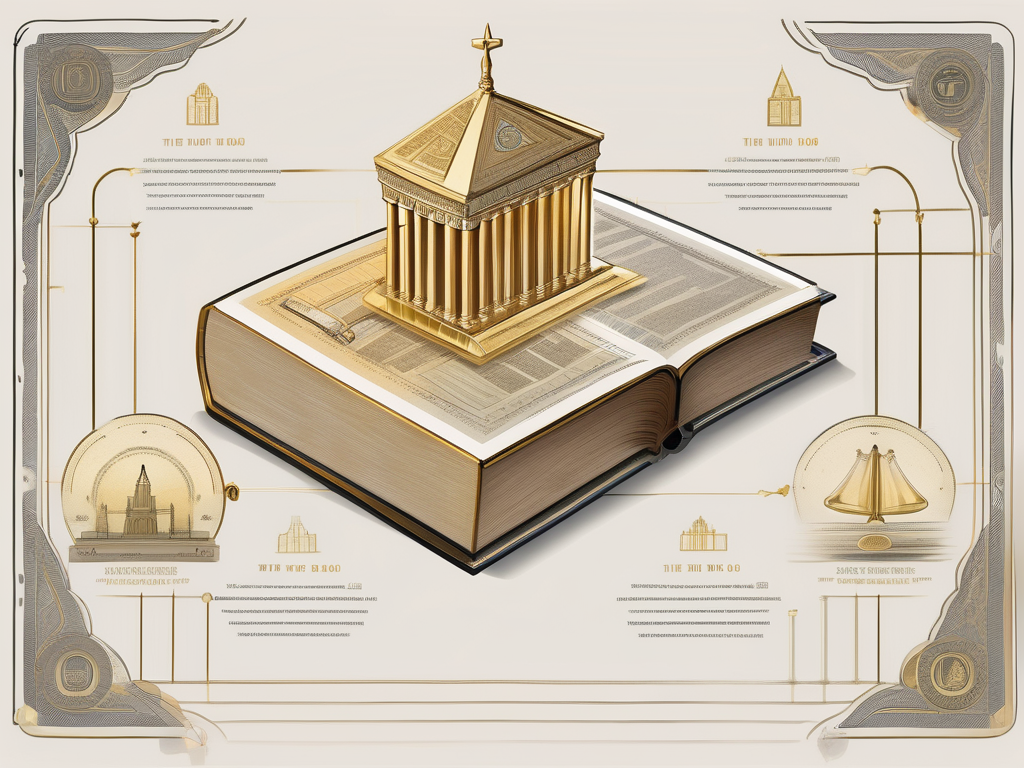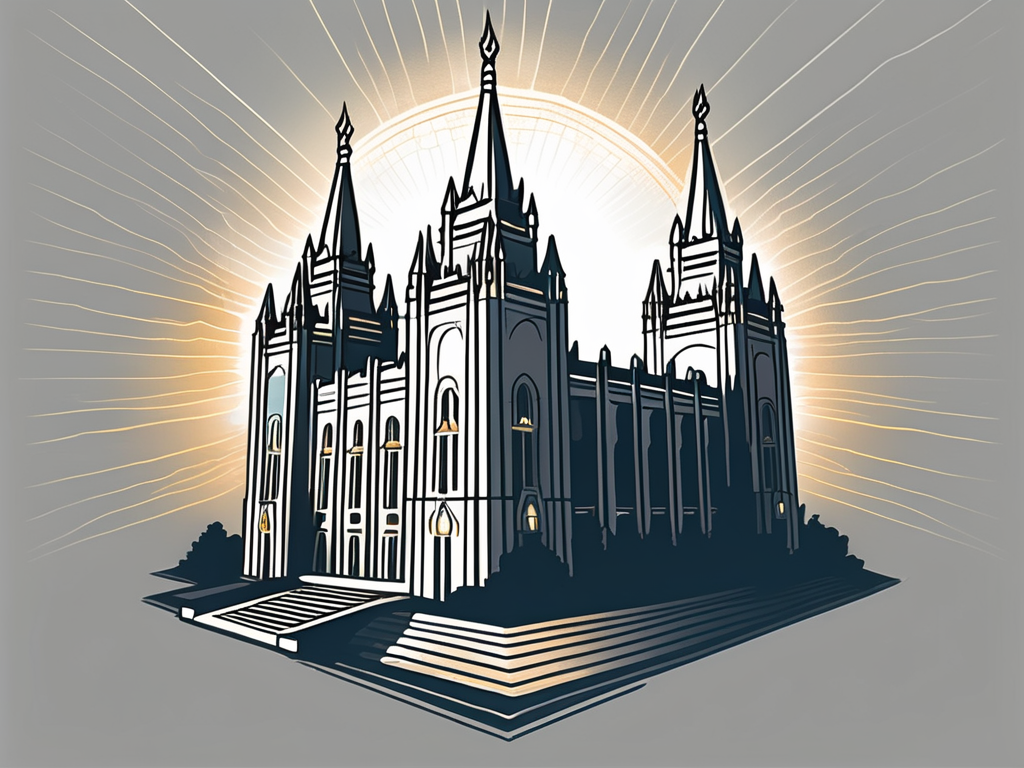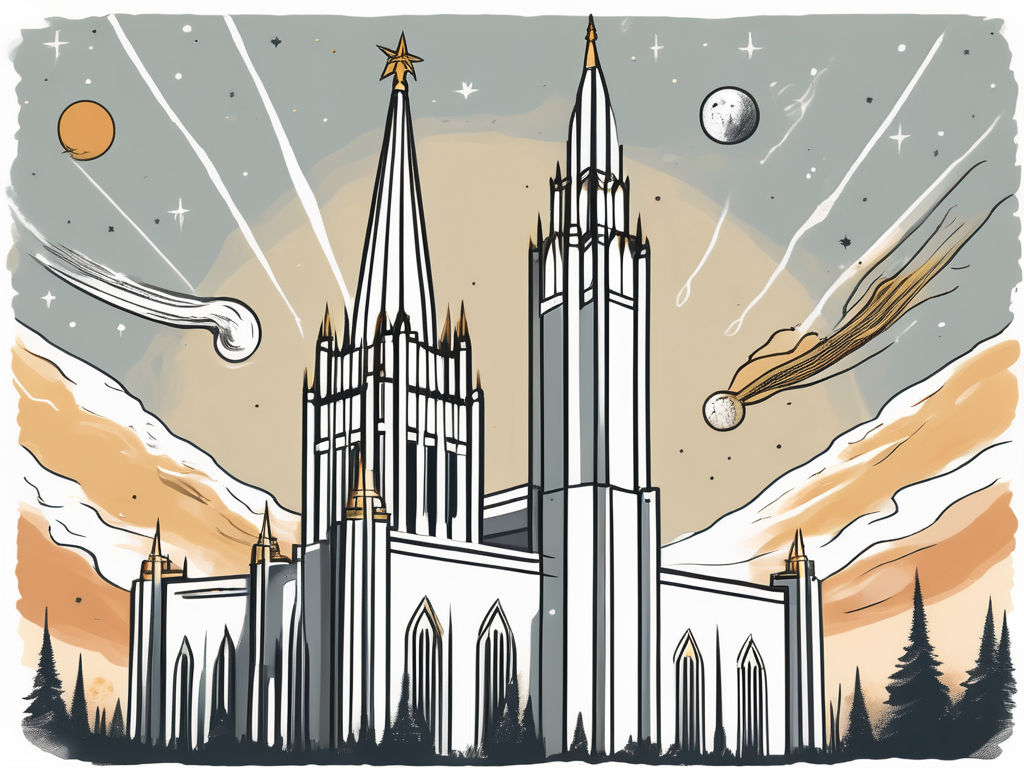Today, we delve into the intriguing world of religion and explore the differences and similarities between two prominent faiths: Mormonism and Evangelical Christianity. While both groups fall under the Christian umbrella, their beliefs and practices are distinct and unique. Join us as we embark on a comparative journey to understand these two distinct religious paths.
Understanding the Basics of Mormonism
Let’s begin our exploration by delving into the core beliefs and practices of Mormonism. At its foundation, Mormonism is centered around the idea that Joseph Smith, Jr. received a revelation from God in the early 19th century, leading to the restoration of the true gospel. This revelation, known as the First Vision, is a pivotal event in Mormon history and marks the beginning of a new religious movement.
Mormons believe in the Book of Mormon, which they consider to be another testament of Jesus Christ, in addition to the Bible. This sacred text, translated by Joseph Smith, is believed to contain the writings of ancient prophets who lived on the American continent. It provides a narrative of their interactions with God and Jesus Christ, as well as their teachings and prophecies.
One of the defining aspects of Mormonism is its belief in living prophets. Mormons see their leaders as direct messengers from God, guiding and providing revelations to the faithful. This strong emphasis on prophetic leadership sets Mormonism apart from other Christian denominations and is a key point of divergence between Mormons and Evangelicals.
Furthermore, Mormons have unique views on salvation and the afterlife. According to their teachings, individuals have the potential to become gods themselves and achieve heavenly exaltation. This concept, known as eternal progression, distinguishes Mormonism from Evangelical Christianity’s belief in salvation through faith alone.
In addition to their distinctive beliefs, Mormons also have a strong sense of community and family. The Church of Jesus Christ of Latter-day Saints, the official name of the Mormon Church, places great importance on the institution of the family. Mormons believe that families can be together forever, not just in this life but also in the afterlife. This belief is reflected in their emphasis on marriage and the eternal nature of family relationships.
Mormons also have a unique approach to health and well-being. The Word of Wisdom, a dietary code revealed to Joseph Smith, encourages Mormons to abstain from harmful substances such as alcohol, tobacco, coffee, and tea. It also promotes a healthy lifestyle, including a balanced diet and regular physical activity.
Another notable aspect of Mormonism is its emphasis on education. Mormons place a high value on learning and intellectual growth. The Church operates several universities and colleges, including Brigham Young University, which provide a strong academic foundation while also incorporating religious teachings into the curriculum.
Overall, Mormonism is a complex and multifaceted religion with a rich history and diverse set of beliefs and practices. By understanding the basics of Mormonism, we can gain a deeper appreciation for the faith and its followers.
Delving into Evangelical Christianity
Now, let’s shift our focus to Evangelical Christianity and explore its fundamental beliefs and practices. Evangelicals place a strong emphasis on the authority of the Bible and strive to spread the teachings of Jesus Christ to all corners of the world.
Evangelicals believe in the concept of salvation through faith in Jesus Christ. They consider salvation to be a gift from God, obtained through personal acceptance of Jesus as their Lord and Savior. This belief aligns closely with the broader Protestant tradition.
The Bible holds a central place in Evangelical Christianity. It is seen as the inspired and infallible Word of God, serving as the ultimate guide for living a righteous and purposeful life. Many Evangelicals engage in regular Bible study and prioritize the importance of scripture in their spiritual journeys.
Evangelical Christians believe in the power of prayer as a means of communicating with God. They view prayer as a direct line of communication with the divine, allowing them to seek guidance, express gratitude, and present their needs and concerns. Prayer is seen as a vital component of their relationship with God and is practiced in both private and communal settings.
Evangelicals also place great importance on the concept of evangelism, which refers to sharing the Gospel message with others. They believe that it is their duty to spread the teachings of Jesus Christ and to bring others to faith in Him. This can take various forms, such as participating in missionary work, engaging in personal conversations about faith, or supporting evangelistic organizations.
Worship is a central aspect of Evangelical Christianity. It is seen as a way to express devotion, gratitude, and reverence to God. Evangelical worship services often include elements such as singing hymns, praying together, reading scripture, and listening to sermons. Music plays a significant role in worship, with many Evangelical churches incorporating contemporary Christian music into their services.
Community is highly valued within Evangelical Christianity. Believers often gather in churches or small groups to support and encourage one another in their faith journeys. These communities provide a sense of belonging, accountability, and opportunities for fellowship. They also serve as a platform for various ministries and outreach initiatives aimed at meeting the physical and spiritual needs of both believers and non-believers.
Evangelicals are known for their strong moral convictions and commitment to living out their faith in all areas of life. They strive to uphold biblical principles and values, seeking to make a positive impact on society. This can manifest in various ways, such as advocating for social justice, engaging in charitable work, or participating in political activism.
In conclusion, Evangelical Christianity is characterized by a deep reverence for the Bible, a strong emphasis on personal faith in Jesus Christ, a commitment to prayer and evangelism, vibrant worship, a sense of community, and a desire to live out one’s faith in a way that positively influences the world.
Similarities Between Mormonism and Evangelical Christianity
Despite their differences, there are intriguing areas of overlap between Mormonism and Evangelical Christianity. Both emphasize the importance of faith in Jesus Christ and the belief in a divine Creator. Additionally, both groups share core principles such as honesty, integrity, and the importance of family values.
When it comes to faith in Jesus Christ, both Mormons and Evangelicals believe that He is the Son of God and the Savior of humanity. They both strive to follow His teachings and example, seeking to live a life of love, compassion, and service to others. This shared belief in Jesus as the central figure of their faith creates a common ground for dialogue and understanding.
Moreover, the belief in a divine Creator is another area where Mormons and Evangelicals find commonality. Both groups affirm that God is the ultimate source of all existence and that He is actively involved in the affairs of humanity. They believe in the power of prayer and seek guidance and strength from their Creator in their daily lives.
However, the similarities between Mormons and Evangelicals extend beyond theological beliefs. Both groups place a strong emphasis on values such as honesty, integrity, and the importance of family. They believe in the sanctity of marriage and the significance of nurturing strong familial relationships. This shared commitment to family values creates a sense of unity and purpose within their respective communities.
Furthermore, Mormons and Evangelicals engage in various practices and rituals that strengthen their faith communities. Regular attendance at religious services is a common practice among both groups, providing an opportunity for worship, fellowship, and spiritual growth. Additionally, prayer plays a central role in the lives of Mormons and Evangelicals, as they believe in the power of communication with God. Through prayer, they seek guidance, express gratitude, and find solace in times of difficulty.
Acts of service are another shared practice that fosters communal bonding and spiritual growth. Both Mormons and Evangelicals believe in the importance of reaching out to those in need and making a positive impact in their communities. They engage in volunteer work, charitable endeavors, and humanitarian efforts, demonstrating their commitment to living out their faith through acts of love and compassion.
In conclusion, while there are distinct differences between Mormonism and Evangelical Christianity, there are also significant areas of overlap. Both groups share a deep faith in Jesus Christ and a belief in a divine Creator. They uphold core principles such as honesty, integrity, and family values. Moreover, they engage in practices and rituals that strengthen their faith communities and promote spiritual growth. By recognizing and appreciating these similarities, Mormons and Evangelicals can foster greater understanding and dialogue, promoting unity and cooperation among believers.
Differences Between Mormonism and Evangelical Christianity
While there are areas of commonality, it is crucial to acknowledge the significant divergences between Mormonism and Evangelical Christianity. These disparities arise from varying interpretations of scripture and theological teachings.
One of the primary points of divergence lies in their respective beliefs and doctrines. For instance, Mormons believe in the concept of eternal marriage and the existence of multiple heavens, while Evangelical Christianity does not embrace these ideas. This belief in eternal marriage is rooted in the Mormon understanding of the eternal nature of families and the potential for continued growth and progression in the afterlife. Mormons also believe that through temple rituals, families can be sealed together for eternity, ensuring their eternal bond. In contrast, Evangelical Christianity focuses on the belief in salvation through faith in Jesus Christ alone, without the need for additional rituals or ordinances.
Similarly, the Mormon belief in baptism for the dead and temple rituals differs significantly from Evangelical practices. Mormons believe that through baptism for the dead, living individuals can be baptized on behalf of deceased ancestors, giving them the opportunity to accept the gospel in the afterlife. This practice is based on the Mormon belief in the importance of vicarious ordinances and the interconnectedness of families throughout generations. Evangelical Christianity, however, does not have a similar practice of baptism for the dead and instead emphasizes personal salvation through individual faith in Jesus Christ.
Additionally, Mormons and Evangelicals differ in their social and cultural practices. Mormons, for example, have a strong emphasis on family values and prioritize spending time together. This emphasis on family is reflected in their regular family home evenings, where families gather to study scripture, pray, and engage in activities together. Mormons also place a high value on marriage and encourage their members to marry and have children. In contrast, Evangelicals have traditions that encourage evangelism and mission work, spreading their message to others. They prioritize sharing their faith with non-believers and often engage in activities such as street evangelism, mission trips, and outreach programs.
Furthermore, the organizational structures of Mormonism and Evangelical Christianity differ significantly. Mormonism is characterized by a hierarchical structure, with a centralized leadership that includes a prophet and twelve apostles. This leadership is believed to receive ongoing revelation from God, guiding the church and its members. Evangelical Christianity, on the other hand, is more decentralized, with a focus on individual churches and their autonomy. Each church may have its own leadership structure, and decisions are often made collectively by the congregation or a group of elders.
In conclusion, while there may be areas of overlap, the differences between Mormonism and Evangelical Christianity are significant and shape the beliefs, practices, and organizational structures of these two religious traditions. Understanding these divergences is crucial for fostering respectful dialogue and promoting religious literacy.
The Impact of Beliefs on Social and Cultural Practices
Now that we’ve explored the differences and similarities between Mormonism and Evangelical Christianity, let’s examine how these beliefs shape their social and cultural practices.
Mormon Social and Cultural Practices
Mormons place great importance on the family unit. They believe that families can be together for eternity, which influences their commitment to strong familial relationships and support systems. Mormons also abide by a strict moral code, which includes abstaining from alcohol, tobacco, and illegal drugs.
Furthermore, Mormons participate in various cultural practices such as wearing special undergarments, attending Sunday worship services, and engaging in genealogical research to connect with their ancestors. These cultural practices provide a sense of identity and unity within the Mormon community.
Evangelical Social and Cultural Practices
Evangelicals are known for their active involvement in their communities and dedication to spreading their faith. They actively engage in mission work, both locally and abroad, seeking to share the teachings of Jesus Christ with others.
Evangelical Christians also participate in regular worship services, which often include lively music and passionate sermons. These services foster a sense of community and serve as a platform for spiritual growth and connection with like-minded individuals.
Furthermore, Evangelicals emphasize the importance of moral standards and personal accountability in their social interactions. They strive to live according to biblical principles and seek to make a positive impact on the world around them.
Conclusion
In conclusion, the comparative analysis of Mormonism and Evangelical Christianity highlights both the shared aspects and distinct differences between these two faiths. While they share a foundation in Christianity, their beliefs, practices, and cultural expressions diverge in various ways.
Understanding these differences and similarities helps foster dialogue, deepen mutual understanding, and promote respect across religious boundaries. It is through such exploration that we can appreciate the rich and diverse tapestry of human spirituality. Whether Mormon or Evangelical, ultimately, we are all individuals on unique spiritual journeys seeking meaning, purpose, and connection.












